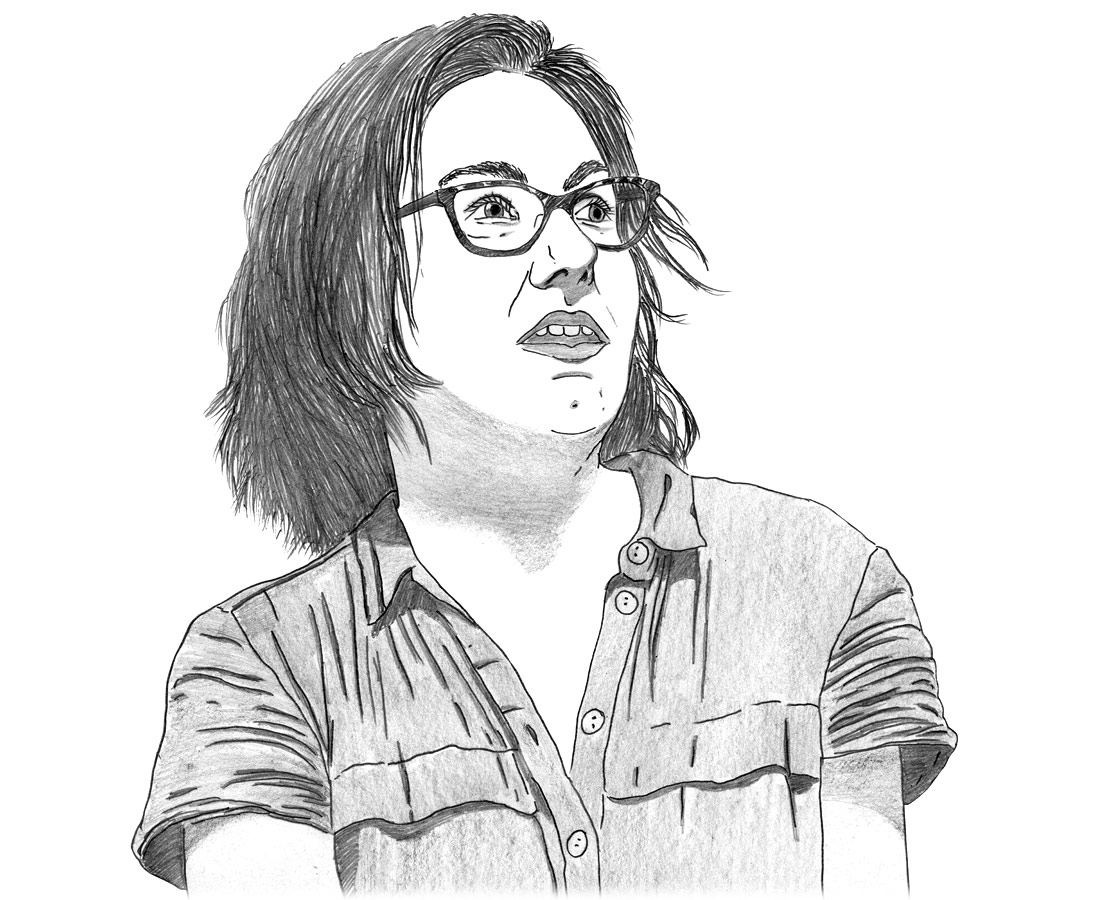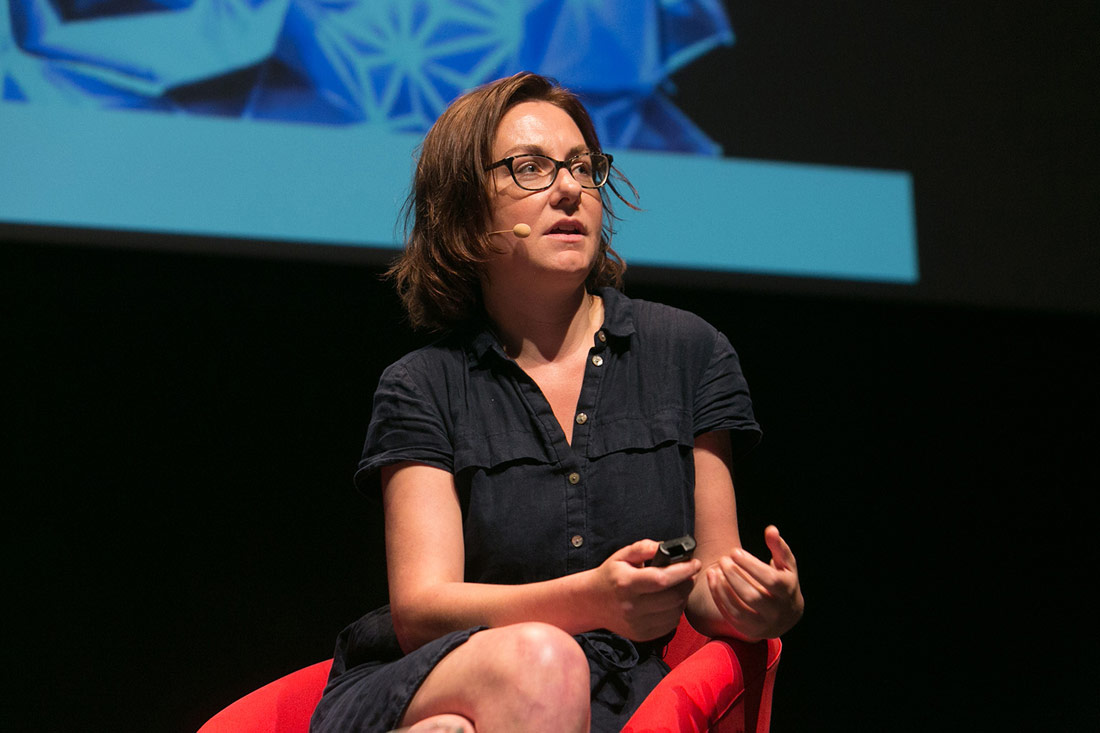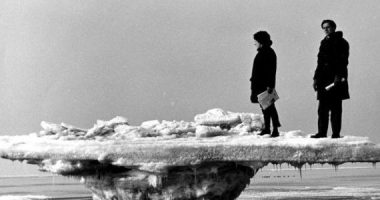
Lucy Wood | Illustration by José Antonio Soria | CC-BY
Climate change is taking place at a speed at which neither the planet nor the species living in it are able to adapt. The message that we receive from the media is frightening. With over a decade of experience working with public programmes devoted to climate change, food and migration, Lucy Wood is well aware of it. She was the director of the international environmental arts charity Cape Farewell and, in 2015, she managed the UK delivery of the major global festival ArtCop21. She is currently organising a new major festival in the UK called The Season.
Wednesday morning, 9.30 a.m., London. Creative producer Lucy Wood takes the train to Barcelona to be a jury member at the Cultural Innovation International Prize launched by the CCCB. Her decision to travel by train has nothing to do with flight availability or with an air-traffic controllers strike. As an environmentalist, Wood is completely coherent with her commitment to change and to building a socially cohesive, low-carbon future for all. She has no car and she does not even want to hear about owning one. She believes in change towards sustainability and thinks that the real revolution starts when people become aware of what they eat, what they wear, how the energy they consume is produced, and so on.
So you came to Barcelona from London by train.
I don’t fly anymore unless I absolutely have to. There are lots and lots of reasons for it: to start with, my genuine dislike of flying. I really love travelling by train and by sea. I love the slow travel movement. To continue with the experience of flying, as an environmentalist I have to say it is not a sustainable practice. Also, it’s the act of travelling that way. When you get on a plane, it feels a bit like being put into a bag and shaken about, and then you arrive in your destination with no real appreciation of the journey you have taken, apart from the fact that it was a bit annoying, difficult and stressful.
What about your clothes or even your glasses? Have you bought them as an environmentalist too?
One of the projects among the finalists of the Cultural Innovation International Prize is fascinating: it’s called Upcycling de Barri. The idea, basically, is that you could come along with some old plastic, turn it into chips, and then 3D print your own new glasses.
To be honest, I haven’t looked into sustainable glasses. I’m sure it’s a sector that needs developing. I am certainly very interested in the creative industries and in the concept of creative disruption: making products that you only need to buy once. Obviously, this single use, repeated-buying culture, which is based on obsessive consumption, is a huge problem. The neighbourhood upcycling project is really interesting insofar as you could question, “Oh well, they’re talking about the culture of plastic, where you’re just taking old plastic to make more”. But actually, it’s the philosophy behind making an item, realising the painstaking love and time that goes into it, that will make you think twice before you just go and flippantly buy something. Sustainable glasses is definitely an area I need to look into.
The week prior to this interview, some of the headlines in the media were: “Trump withdraws from the Paris Climate Agreement”, “Physicist and climatologist James Hanson says global temperature will go up 2 more degrees”, “Antarctica is going greener”. Not very good news for the planet.
Things are moving at a horrifying speed. There is a part of me that feels like Sarah Connor in the Terminator films, when she is screaming and no one is listening to her and then there’s a huge black apocalypse. Certainly, various studies have shown that people who work in climate change —climate scientists, climate public engagement people— tend to have a higher incidence of anxiety and depression. But then again it’s the dilemma of the chicken or the egg, because maybe they are that sort of deep-thinking, intelligent, introspective people anyway. In any case, what you have to do is flip the situation on its head. Yes, a vast number of species are already committed to extinction, which is really scary —they are not extinct yet, but we have to accept that some of them will become extinct. However, this is an opportunity, not only to switch the way we power our lives, but also to rethink how we live, work, define ourselves, travel, consume and everything else.
Many people still deny climate change.
There is a little sketch cartoon that is doing the rounds, which quite a lot of people reference. A guy on a stage is extolling all the good things that would come out of combatting climate change: we would have healthier, better communities, people would be fitter, we would work less, we would consume less, we would spend more time with our friends and family, etcetera. And then someone in the audience says, “But what if climate change is just a big hoax and we create a better world for nothing“. We have to remember that what we are actually trying to do is change lots of things about the way we live that don’t make us happy anyway.
Climate change is happening at a rate at which our planet and our species are not able to adapt. Yes, there has been climate change in the past, but it has taken thousands of millions of years. This is happening at a rate of centuries.
That being said, you can have all the doom and gloom, but what’s amazing is that there are so many amazing, exciting initiatives already happening. One of them might perhaps be about rethinking how hard we work. We are trying to work smarter, not harder. People are working more from home; they are spending more time with their families. Change is happening. Community cooperatives and city farms are proliferating. People are getting back into knitting and doing clothes swaps. A lot of what’s happening is really positive for the community, regardless of what you think about environmental issues. However, I must say a vast majority of the public are not thinking or talking about climate change.
And that is what The Season aims at changing.
The Season is a project we are setting up with Julie’s Bicycle, Artsadmin —a brilliant arts organisation based in London— and the Battersea Arts Centre, which is a really pioneering theatre and arts space in South London. There is a national think tank called What Next, where cultural professionals and industries can come together to tackle important problems. It might be problems with education, gun crime or pollution, but there is a specific subgroup for climate change. And we had an idea about the cultural and creative industries coming together to all start talking about climate change. We need to make it part of our normal lingua franca. We need to make it part of our everyday culture and language. So what we need is a cultural shift.
For example, think about the way people might have talked about the LGTBQ community 40 years ago, or even while I was growing up, let’s say 20 or 30 years ago, when I was really little. The idea of Mardi Gras, the Gay Pride marches being as massive as they are today, really big public figures coming out as gay and being completely accepted, gay marriage… even 20 years ago, all of those achievements might have been unthinkable.
But change is possible.
It is! The problem with climate change is that there is so much nihilism and despair. People can’t envision the change, and if you can’t see change, it will never happen. That is why working with scientists and artists is so crucial. Artists are brilliant at hypothesising, at suggesting a different way of seeing the world, and one of those different ways is imagining a post-carbon world. That means a lot of change on a lot of levels.
So The Season, which is called “the Season for Change: Inspiring Creative Actions on Climate Change”, is trying to get every major cultural organisation across the UK to commission a piece of work that in some way addresses the subject. They should do it over the season, which will be from June to December next year. The aim is to create so much noise about climate change that it cannot be ignored anymore and it starts to be talked about in the streets, in the pub, around the swimming pool. The goal is to get everyone talking about it.
Do you think that the way climate change is addressed in the media may cause people’s disconnect from the problem?
The language of catastrophe, nihilism and despair is extremely problematic and does not help the cause at all. Instead, if you reduce it to more bite-sized, digestible ideas (what you choose to eat every day, how you get to work, the air that you breathe) you turn it into a manageable problem, something that you have got agency to change. That can engage people.
It is not about saying, “Don’t do that”. It is about simple things, such as extolling the virtues of cycling and why it will make you look better, feel better and live longer. Cycling means you can eat whatever you want without getting fat! That’s a way of swapping it around. We are not perfect creatures. We never will be, that’s for sure, we are humans and we are very fallible in many ways. But the small things you can do are actually key, something as simple as switching to renewable energy, for instance. With his insane, stupid rhetoric about Make America fucking Great Again, Trump says, “Oh, we’ll bring back the coal industry”. What he doesn’t realise, even though it’s the absolute fact of the matter, is that renewables already employ four times as many people as the coal industry could ever employ.
Sugiero cambiar la segunda parte de esta paráfrasis por la cita exacta, que tiene más sentido y hace más gracia. En lugar de «and this is all a waste of time», sería «and we create a better world for nothing».

Lucy Wood | © CCCB, 2017. Autor: Miquel Taverna
And renewables don’t kill people, like the coal industry does.
Exactly. It is very important to remember that this is not even a common sense issue. It’s an ideological problem that certain people have. Renewables, by their very nature, are inherently socialist. We all have access to them, right here, right now. With the right technology, you can go off-grid. You don’t have to be part of big coal, big oil or big gas. And that terrifies the status quo. That is a problem for our global economic system. It is a problem for petrodollars. The vast majority of wars are caused by access to oil in some way, certainly in the last few decades. So think about the world that renewables could bring about. It would certainly be a better one —maybe not a utopia, because utopia does not exist, but we could at least make it a little bit more pleasant.
How can we contribute, through the arts, to making people aware of this so that they can do the switch?
You can have all the information in the world. You can read all the stats. But time and time again, studies have proven that facts don’t engage people the way good art does. By arts I mean anything, from architecture to the way your car is designed. Everything is art, everything is designed. And you can influence behaviour. Most importantly, the arts can foster behaviour change and engagement, because they move us on a visceral, more human level in a way that facts simply don’t.
You can’t just give someone a piece of paper with lots of statistics and data on it and expect that to be enough. That is where the arts come in. Great art can move us on a cellular level in a way that facts alone cannot.
So, in the first place, art can move us. What else can it do?
It cannot be wailing, gnashing of teeth and operatic awfulness about how terrible everything is. It has got to also present solutions for what we can all do. It is about the inclusivity of art. It’s about saying, “This isn’t a problem that we are pointing out so that the Government has to do something. We are inviting you into this as a movement”. The environmental movement in the UK has co-opted a quote that perfectly defines this for me, which is: “We are not defending nature, we are nature defending itself”.
Nevertheless, the prevalent idea seems to be culture versus nature.
Simone de Beauvoir wrote a lot about that in The Second Sex, about how we associate men with culture and women with nature (we are, of course, but somehow men are thought to be apart from it). Without making it a feminist issue —although climate change is, in many ways, a feminist issue, but that’s maybe another conversation— we need to realise that we are nature. That is why I have problems with the idea of creating sanctuaries, because we should not create a little box and say, “Fine, tick, that’s sorted”.
We have got to think about every aspect of our entire environment all the time, and that’s a massive paradigm shift. Some people think, “Oh well, I do my recycling, that’s enough”. Unfortunately, it’s not enough. In fact, reading the stats about recycling is a bit depressing, because the waste is shipped to China, and the carbon it takes to ship it there neutralises the impact.
I would like to tell you about Invisible Dust, which is where I work now.
Go ahead.
Invisible Dust exists to make the invisible visible. We commission world-class art. We put artists in residence with scientists to create amazing world-class art that engages people in vital issues around climate change and wider environmental issues.
For example, we commissioned this incredible piece of work called The Human Sensor, for which a group of performers and dancers wore beautiful wearable technology. They wore masks that lit up according to the level of pollution the wearer was breathing in. This troupe of about 12 dancers would travel around the centre of Manchester and London, and you would see, particularly at a traffic stop, how their masks would start glowing as they breathed in and out. So we coupled really cutting-edge technology with brilliant design and artistry. I am a producer for them at the moment.
I am also working on a really exciting project off the north coast of Scotland looking at the health of the oceans together with a filmmaker.
Is that a community project?
Yeah, it’s called Shore and it’s going to be a co-created film with hundreds of members of the communities from loads of different islands right across the northwest coast of Scotland. There will be some underwater filming, but actually it’s much more about asking people, “What does the sea mean to you?”, because the fishing industry has taken a massive hit. Most of the big fishing vessels that come in are international. They dredge along the seabed, they destroy everything in its wake and the fish stock has been massively depleted. People living in coastal areas will go to Tesco and buy prawns that have probably been fished 500 metres away and then shipped to China to be de-shelled and then shipped back. Our disconnect with our food system is totally crazy.




Leave a comment